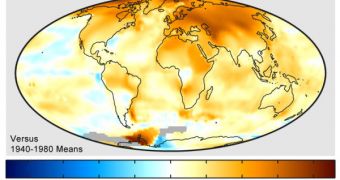One of the main conditions related to finding a solution in the issue of global warming and climate change is to have strong popular support. That is to say, the economic measures that need to be set in place in order to reduce the amount of pollution being emitted into the atmosphere are very likely to imply higher energy costs for the general population. The people need to know that these higher costs are not set in place for profit, but in order to provide their children with a better planetary environment in the future. However, a new study reveals that fewer Americans believe the phenomenon is real.
Despite uncontroversial evidence that the planet is warming, the number of individuals that consider it to be a real problem is steadily decreasing, thanks, in part, to the misinformation and propaganda spread by lobbyists and scientists associated with the big oil industry. They spread doubt among the general population, and intentionally publish studies that arrive to wrong conclusions, based on the same data that show that global warming persists and gets more serious every day.
In a new poll, published a few days ago by the Pew Research Center for the People and the Press, it's being revealed that the number of those who believe “there is solid evidence that the earth is warming” dropped to 57 percent in 2009, as opposed to 71 percent in April 2008. One of the main reasons for this decrease may be the fact that the uncertainties related to climate models are beginning to be made public, and that people no longer associate them with the words “solid evidence.” The changes, Pew reports, affect all political categories, Democrats, Independents and Republicans alike.
The investigation also reveals that, strangely enough, more than 50 percent of the study respondents agree with introducing carbon taxes, even knowing that this would increase energy costs. Just 39 percent of people oppose it. This can only mean one thing, analysts say, namely the fact that, even though Americans believe that “solid evidence” has yet to be fully proven, there is still an urgent need to take preemptive steps in mitigating the effects that our pollution is inflicting on the atmosphere. There is, of course, another interpretation for the study results, some say, and that is the fact that US citizens are simply inconsistent in their beliefs, Technology Review reports.

 14 DAY TRIAL //
14 DAY TRIAL //